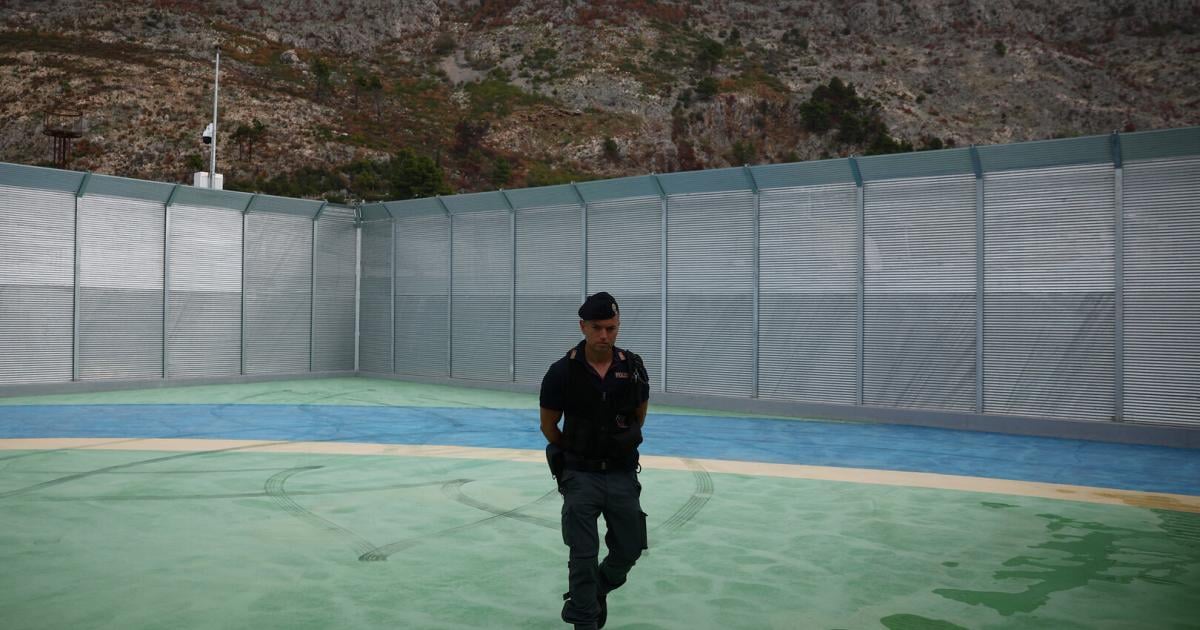It is the next legal defeat for the Italian Prime Minister Giorgia Meloni. A court in Rome has it Internment of seven men in Italian Migration center in Gjadër in Albania suspended.
The men from Bangladesh and Egypt were picked up in the Mediterranean in recent days and taken to Albania on Saturday on board the Italian Navy ship “Libra”.
Now they are back in Italy: the coast guard shipped them across the Adriatic to the port town of Brindisi. They went ashore there at night.
The court in Rome ruled that accommodating the refugees in a camp outside the EU was not legal. In the dispute over the so-called Albania model, the right-wing government in Rome suffered its second defeat within a short period of time: on October 18, the same court rejected the internment of twelve migrants.
The first judge’s verdict triggered violent reactions. One of the judges who refused to accommodate the refugees had to be placed under police protection after receiving death threats.
The dispute has developed into a heated confrontation between Meloni’s government and the judiciary. The case is before the European Court of Justice in Luxembourg. Italy’s highest court, the Court of Cassation in Rome, is also dealing with the issue.
It is up to the government to define what a safe country is with regard to migration, Meloni raged after the judges’ decision. Her party Fratelli d’Italia spoke of “judges politically influenced by the left”. “They want to abolish Italy’s borders.”
“We could not act differently or make any other decision. The judgment of the European Court of Justice binds not only us judges, but also the public administration,” defended Luciana SangiovanniPresident of the Migration Department of the Court of Justice of Rome, approved the decision.
The decision of the six judges in Rome is based on a ruling by the European Court of Justice (ECJ) from the beginning of October. This states that an EU country can only define a third country as a safe country of origin in asylum law if the conditions for this are met throughout the entire territory of the state.
The government in Rome then quickly approved an official list of “safe countries”. A court in Bologna, in turn, submitted this list to the European Court of Justice with the question of whether it is actually valid.
High costs
It is now unclear whether Italy can continue to operate the two camps on Albanian soil.
Since mid-October, the Albanian refugee centers have been empty, with the exception of a few days, but are staffed by almost 300 employees: translators, cleaners, medical and nursing staff as well as police and carabinieri.
The opposition parties complained about the high costs of the project. The government costs 134 million a year to operate the camps, which corresponds to a total expenditure of around 670 million euros over five years. The costs of transferring migrants caught in the Mediterranean to Albania are now also a concern for the Court of Auditors in Rome. Due to pressure from NGOs and opposition parties, the expenditure on the naval ship “Libra” is to be examined. Opposition parties put the cost of the transfer at 20,000 euros per person; Interior Minister Matteo Piantedosi quoted 8,400 euros per day as the cost.
As Piantedosi explained in a question time in parliament, Meloni’s government sees the spending as “an investment” that will make it possible to reduce the cost of receiving migrants, “which today amounts to about 1.7 billion per year.” .
A year ago, Italy and Albania agreed to set up reception centers for asylum seekers in Albania operated by Rome. The asylum centers are operated according to Italian law and with Italian staff. Italy is the first country in the European Union to decide on asylum applications outside the EU. The controversial “Albania model” is being watched closely by all other EU countries. Other right-wing governments in particular are considering following the Meloni model. Human rights organizations sharply criticized the agreement. They want to know how Italy plans to ensure that all human rights are respected in reception centers outside the EU.
Italy is one of the countries particularly affected by the refugee movement from Africa to Europe across the Mediterranean. Last year in particular, the numbers were high: almost 160,000 migrants reached Italy’s shores on boats. Fewer than half as many people are currently arriving than a year ago. Nevertheless, tens of thousands continue to set off in boats that are often barely seaworthy.
